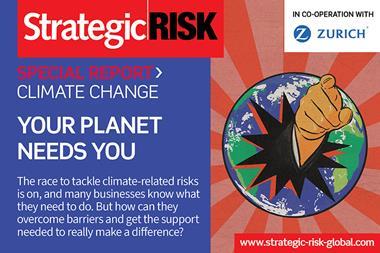Today’s “wealth of data” can be used to construct risk transfer products for extreme weather - Nephila’s Barney Schauble
COVID-19 may have shaken our economy and society to the core, but there’s a “bigger threat” on the horizon – climate change – and risk managers need to prepare their financial plans now for what promises to be a very uncertain future.
“We are likely now to be facing the worse recession since the 1930s,” said Felipe Larraín Bascuñán, senior adviser, Global Center on Adaptation and former minister of finance under President Sebastián Piñera, Chile.
“But climate change poses a bigger long term threat to financial stability than the Covid-19 pandemic, which has shown that our economies are not wired to cope with the challenges of the 21st century.”
Speaking at a webinar organised by the Coalition for Climate Resilient Investment (CCRI), he urged organisations to explore new ways of managing their risks.
“What we experience now is giving us a taste of how the world might react to those catastrophes triggered by a warming climate, such as extreme weather events, biodiversity loss, bread basket failure and mass migration,” he said.
Companies are estimating a potential $250 billion in lost assets because of climate change, with the financial services industry accounting for 80% of that exposure, according to the Carbon Disclosure Project.
In this context the private finance industry must provide the instruments that will help protect capital and livelihoods.
For example, parametric insurance, which pays out on the basis of a triggering event – such as extreme weather – rather than a pure loss.
“It is fully automated, which means we can pay out a few hours after an event happens,” said Antoine Denoix, CEO, AXA Climate.
Denoix identified three major benefits of parametric products. The first is transparency, which is key for capital markets and customers. The second benefit is speed; there is less need for loss adjusters to be out in the field and fast money can lesson the impact of a loss.
The third benefit is inclusion. Because parametric insurance relies on remote technology it can cover more of the population and be more inclusive in the way it protects them.
“The good news is that availability of data is better than it has ever been, globally and not just in developed markets,” said Barney Schauble, chairman, Nephila Climate.
“That wealth of data can be used to construct risk transfer products – and the good news again is that we are seeing that from the top down as well as bottom-up.”
While large insurers and governments are already involved, sometimes supported by the World Bank, there are also innovative solutions at the citizen level, with small tech start-ups or local insurers offering parametric coverage directly.
Through all these organisations the tools are beginning to be available that will make bad weather better.
But we must embrace them and extend our vision of risk into the long term, according to Carlos Sanchez, director Climate Resilient Finance, Willis Towers Watson, if we want to really ensure that “every dollar invested maximises the protection of economic and social continuity.”




















No comments yet